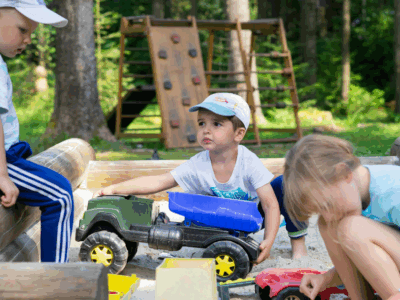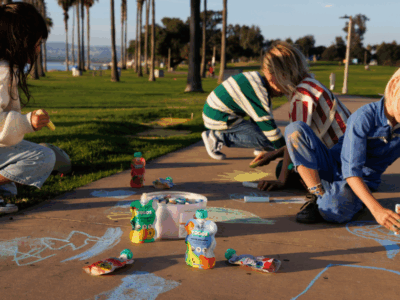Whether the first few months of parenthood have flown by, or crept along at a slightly slower pace, you can look forward to some huge developmental leaps during your baby’s fourth month of life. Four month milestones include fresh skills in coordination, vision, and vocalization. Your four month old baby has definitely moved on from the newborn stage, and is solidly in the middle of the “adorable and interactive infant” stage that we all look forward to. As your baby starts to explore more of the world around them, the fun really begins!
At four months of age, your baby may…
Roll from tummy to back. And you better watch out! This skill opens up a whole new world of movement. Rolling, the first sign of mobility in your infant, indicates that it is time to be more aware of where you set baby down. Tummy time might become a little more complicated too, as your baby may insist on rolling any time you set her down on that squishy belly!
Reach and grab for objects. While your baby may have been batting at toys or bright objects for a few weeks now, by four months he could start grabbing them successfully. The reach and grab move is more likely to happen during tummy time, so you can gently encourage this by placing a few brightly colored toys around when your baby is exploring the world from his playmat.
Hold her head up. Babies at this age have generally mastered the art of good head control. Your baby can probably pop her head up to see what is going on if she is lying down on her belly. Some babies may even use their strong arms and shoulders to push more of their upper body off the ground.
Push down on those little toes. If you hold your four month old up and place his feet on the ground, he will probably push back! Those thick, chubby little legs are gaining strength, and your baby has more control over his actions in the lower body. He may also push down on your lap when you try to hold him up for a quick smooch!
Have doubled their birth weight. By this point, your tiny eater has probably packed on a few pounds, and she has likely doubled her birth weight.
See a large variety of colors. While newborns have fuzzy vision, your four month old is now able to see a large variety of colors. He can’t yet determine depth, but he should be able to follow objects with his eyes, or even spot a bright toy from across the room.
Start imitating sounds. This is a big one! Around four months after birth, your baby will start to imitate the sounds that she hears often. Her vocal range will start to expand, and she may even be able to repeat favorite sounds like, “ba ba ba ba,” or even the coveted, “ma ma ma”!
Recognize people and faces. It’s around this time that your baby will be able to recognize the people he sees most often. When an unfamiliar face comes near, he might take a moment to really study that person before deciding how to react. Also, this is the time when stranger anxiety can start to set in, so warn grandma not to be offended if baby doesn’t welcome her with open arms during her next visit!
Laugh. Those sly little smiles that eventually turned into coos and giggles last month? Right around four months those giggles will spill over into full on roaring laughter. There isn’t a much sweeter sound than that first real laugh from your tiny bub.
Begin to sleep through the night. While this milestone varies the most, around four months is the earliest that your child may begin to sleep through the night. However, don’t fret if your baby isn’t there yet. Sometimes this one doesn’t stick until well after your baby turns a year old. For those rare babies that do begin to sleep all night around the fourth month, keep up the good work!
Your baby at four months old is just beginning to really look around and process the world surrounding them. Since your baby can now reach and grab objects, make sure to keep small items out of baby’s play area. In no time at all, every tiny toy will be going straight from their hand and into their mouth! As your baby is enjoying the newfound opportunities that come with clearer vision and communication, try to foster these senses with fresh sounds, different forms of music, and brightly colored books. A simple afternoon spent watching bugs and birds under the trees might lead to that first deep belly laugh, a sound every parent can’t wait to hear!



